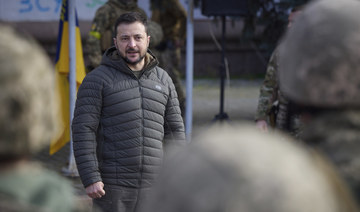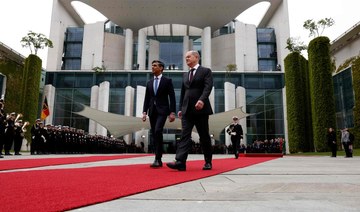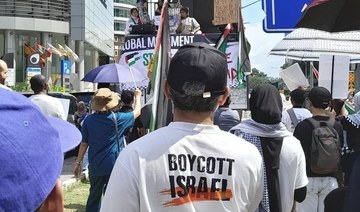WASHINGTON: Ukraine for the first time has begun using long-range ballistic missiles provided secretly by the United States, bombing a Russian military airfield in Crimea last week and Russian forces in another occupied area overnight, American officials said Wednesday.
Long sought by Ukrainian leaders, the new missiles give Ukraine nearly double the striking distance — up to 300 kilometers (190 miles) — that it had with the mid-range version of the weapon that it received from the US last October. One of the officials said the US is providing more of these missiles in a new military aid package signed by President Joe Biden on Wednesday.
Biden approved delivery of the long-range Army Tactical Missile System, known as ATACMS, in February, and then in March the US included a “significant” number of them in a $300 million aid package announced, one official said.
The two US officials, who spoke on condition of anonymity to discuss the delivery before it became public, would not provide the exact number of missiles given last month or in the latest aid package, which totals about $1 billion.
Ukraine has been forced to ration its weapons and is facing increasing Russian attacks. Ukraine had been begging for the long-range system because the missiles provide a critical ability to strike Russian targets that are farther away, allowing Ukrainian forces to stay safely out of range.
Information about the delivery was kept so quiet that lawmakers and others in recent days have been demanding that the US send the weapons — not knowing they were already in Ukraine.
For months, the US resisted sending Ukraine the long-range missiles out of concern that Kyiv could use them to hit deep into Russian territory, enraging Moscow and escalating the conflict. That was a key reason the administration sent the mid-range version, with a range of about 160 kilometers (roughly 100 miles), in October instead.
Adm. Christopher Grady, vice chairman of the Joint Chiefs of Staff, said Wednesday that the White House and military planners looked carefully at the risks of providing long-range fires to Ukraine and determined that the time was right to provide them now.
He told The Associated Press in an interview that long-range weapons will help Ukraine take out Russian logistics nodes and troop concentrations that are not on the front lines. Grady declined to identify what specific weapons were being provided but said they will be “very disruptive if used properly, and I’m confident they will be.”
Like many of the other sophisticated weapons systems provided to Ukraine, the administration weighed whether their use would risk further escalating the conflict. The administration is continuing to make clear that the weapons cannot be used to hit targets in Russia — only those inside Ukrainian territory, according to one of the US officials.
“I think the time is right, and the boss (Biden) made the decision the time is right to provide these based on where the fight is right now,” Grady said Wednesday. “I think it was a very well considered decision, and we really wrung it out — but again, any time you introduce a new system, any change — into a battlefield, you have to think through the escalatory nature of it.”
Ukrainian officials haven’t publicly acknowledged the receipt or use of long-range ATACMS. But in thanking Congress for passing the new aid bill Tuesday, Ukrainian President Volodymyr Zelensky noted on the social platform X that “Ukraine’s long-range capabilities, artillery and air defense are extremely important tools for the quick restoration of a just peace.”
One of the US officials said the Biden administration warned Russia last year that if Moscow acquired and used long-range ballistic missiles in Ukraine, Washington would provide the same capability to Kyiv.
Russia got some of those weapons from North Korea and has used them on the battlefield in Ukraine, said the official, prompting the Biden administration to greenlight the new long-range missiles.
The US had refused to confirm that the long-range missiles were given to Ukraine until they were actually used on the battlefield and Kyiv leaders approved the public release. One official said the weapons were used early last week to strike the airfield in Dzhankoi, a city in Crimea, a peninsula that Russia seized from Ukraine in 2014. They were used again overnight east of the occupied city of Berdyansk.
Videos on social media last week showed the explosions at the military airfield, but officials at the time would not confirm it was the ATACMS.
Ukraine’s first use of the weapon came as political gridlock in Congress had delayed approval of a $95 billion foreign aid package for months, including funding for Ukraine, Israel and other allies. Facing acute shortages of artillery and air defense systems, Ukraine has been rationing its munitions as US funding was delayed.
With the war now in its third year, Russia used the delay in US weapons deliveries and its own edge in firepower and personnel to step up attacks across eastern Ukraine. It has increasingly used satellite-guided gliding bombs — dropped from planes from a safe distance — to pummel Ukrainian forces beset by a shortage of troops and ammunition.
The mid-range missiles provided last year, and some of the long-range ones sent more recently, carry cluster munitions that open in the air when fired, releasing hundreds of bomblets rather than a single warhead. Others sent recently have a single warhead.
One critical factor in the March decision to send the weapons was the US Army’s ability to begin replacing the older ATACMS. The Army is now buying the Precision Strike Missile, so is more comfortable taking ATACMS off the shelves to provide to Ukraine, the official said.
Ukraine uses long-range missiles secretly provided by US to hit Russian-held areas, officials say
https://arab.news/4hzng
Ukraine uses long-range missiles secretly provided by US to hit Russian-held areas, officials say
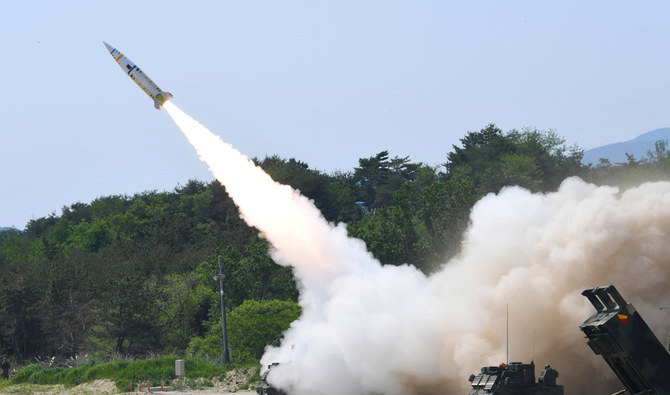
- The new missiles give Ukraine nearly double the striking distance up to 300 kilometers
- The two US officials would not provide the exact number of missiles given last month or in the latest aid package, which totals about $1 billion
More migrant dinghies cross Channel to England despite Rwanda threat
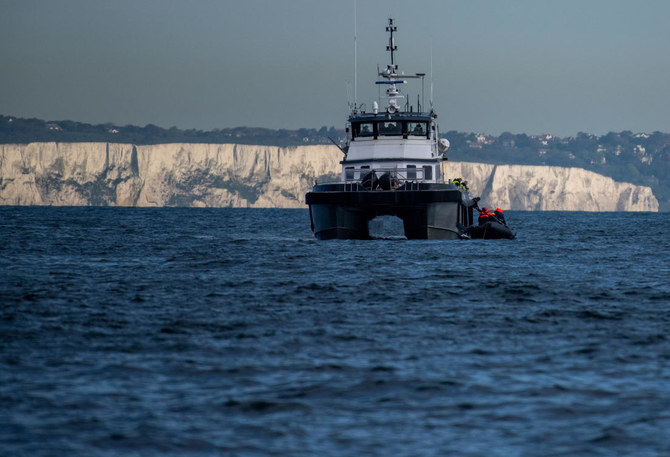
Sunak hopes his flagship Rwanda policy to deport those arriving in Britain without permission to the African nation will deter people from making the Channel crossing
STRAIT OF DOVER: Dozens of people in two rubber dinghies reached the southern coast of England on Saturday, the latest among thousands of asylum-seeking migrants to make the risky sea crossing from France this year.
Bobbing on the waves of the English Channel on a clear morning, the boats sailed across the narrow strip of sea separating France and Britain, with a French naval vessel following them until they reached English waters.
Their largely male passengers, some of whom were in orange life jackets and waving, were taken aboard a British Border Force vessel off Dover.
The arrivals illustrate the difficulties British Prime Minister Rishi Sunak faces on his pledge to tackle illegal migration and “stop the boats,” ahead of a national election expected later this year.
More than 8,000 people have arrived so far this year on small boats, with many fleeing war or famine and traveling through Europe to Britain, making the start of this year a record for such arrivals.
Sunak hopes his flagship Rwanda policy to deport those arriving in Britain without permission to the African nation will deter people from making the Channel crossing. Five people died in the attempt last month.
The government hopes to operate the first flights to Rwanda in 9-11 weeks.
“The unacceptable number of people who continue to cross the Channel demonstrates exactly why we must get flights to Rwanda off the ground as soon as possible,” a spokesperson for Britain’s Home Office said.
“We continue to work closely with French police who are facing increasing violence and disruption on their beaches as they work tirelessly to prevent these dangerous, illegal and unnecessary journeys.”
UK opposition suffers major Muslim vote losses in local elections

- Shadow home secretary: ‘Many people feel really strongly’ about Gaza ‘and rightly’
- Labour MP: ‘It’s not just Muslims. On our doorknocks, we’ve had a lot of middle-class white voters raise it as well’
LONDON: A series of local election victories by the UK’s opposition Labour Party has been overshadowed by a major fall in support among Muslim voters, leading to concern within the party ahead of a general election later this year.
After local elections were held across the country on Thursday, Labour suffered key losses in areas with high Muslim populations due to controversies over the party’s stance on the Gaza war.
Labour must do some “searching” in response to “questions” over its performance, one MP said.
The potential loss of Labour candidate Richard Parker in the West Midlands mayoralty election led to a racism row after an unnamed party source blamed “the Middle East” on deciding the race.
In total, the party gained more than 140 council seats during the elections, The Guardian reported.
But those gains are overshadowed by the potential West Midlands defeat and the Conservative candidate for mayor of London, Susan Hall, running a closer race against incumbent Sadiq Khan than previously expected.
Labour have “trouble brewing on their left flank” after focusing on traditionally rural and whiter areas, said Rob Ford, a politics professor at the University of Manchester.
“There has been a substantial loss of support in heavily Muslim areas and they are going backwards a bit in progressive areas and areas with students. It is progress at a price,” he added.
By offsetting urban losses with gains among rural voters, Labour would win about 34 percent of votes at a general election compared to 25 percent for the Conservatives, the BBC reported.
Yet fear of bleeding urban voters, including Muslims, is driving anxiety in the party ahead of the general election, sources told The Guardian.
“The polls (which predicted a 20-point lead for Khan) were completely wrong, this is going to be much closer than expected,” one source said.
A source in Birmingham, where independent candidate Akhmed Yakoob stood as a spoiler to Labour, said: “Yakoob is picking up over 50 percent in some inner-city wards, so the Gaza impact may be bigger than first estimated.”
Labour also suffered a shock loss in Oldham, losing control of the council after a number of seats were taken by pro-Palestinian independent candidates.
In Manchester, the party lost its deputy leader to a candidate from MP George Galloway’s Workers Party of Britain.
Jess Phillips, Labour MP for Birmingham Yardley, told the “Electoral Dysfunction” podcast in the wake of the vote that the party will have to “wake up and face” the issues that led to losses against independent and Workers Party of Britain candidates.
“I very much expect, as the mayoral votes come in, that in places like Birmingham, Bradford, places with high Muslim populations, as we’ve seen overnight in Oldham, that the Labour Party will have some questions that they have, and some searching to do themselves,” she added, according to Sky News.
Areas with a proportion of Muslim voters higher than 20 percent recorded average losses of 17.9 points for Labour.
The comments by a party source concerning the West Midlands race have led to a post-election race row.
“It’s the Middle East, not West Midlands that will have won (Conservative Mayor Andy) Street the mayoralty. Once again Hamas are the real villains,” the Labour source reportedly told the BBC.
The remarks were condemned by figures including Labour MP Bell Ribeiro-Addy, the Daily Telegraph reported.
“This is a disgusting way to talk about Muslim voters, conflating them with Hamas and treating them as a monolith,” she said. “It reeks of racism and entitlement. Such comments should have no place in the Labour Party.”
According to The Times, MP Zarah Sultana said: “Once again, I’m deeply disturbed by Islamophobic quotes given to the media by ‘Labour sources.’
"When politicians are confronted with racist bile, it should be immediately condemned. As a party we need to listen to and acknowledge concerns, not hold British Muslims in contempt.”
Yvette Cooper, Labour’s shadow home secretary, conceded that the party’s stance on a Gaza ceasefire was “partly” a factor in the surprise defeats.
“Many people feel really strongly about this — and rightly, because tens of thousands of people have been killed, including the majority of them women and children,” she said.
Muslim vote organizers hailed the success of the elections in sending a message to Labour leader Keir Starmer.
Party sources warned that Labour must work overtime to regain the trust of Muslim voters ahead of a general election expected later this year.
“People use local elections to send the government — and sometimes the opposition — a message,” a senior Labour source told The Times.
“The damage is done and even though our position is much better now, if Israel pushes into Rafah people will say we didn’t do enough to urge restraint right at the start.”
A Labour MP added: “It’s terminal with a lot of people, and it’s not just Muslims. On our doorknocks, we’ve had a lot of middle-class white voters raise it as well.”
KFC stores in Malaysia shutter amid anti-Israel boycott

- KFC is not on Malaysian boycott movement’s list, but consumers see it as linked to Israel
- Franchise operator cites ‘challenging economic conditions’ as reason for closures
KUALA LUMPUR: Scores of KFC outlets have closed in Malaysia amid calls to boycott the chain and other brands accused of links with Israel.
Since the outbreak of Israel’s deadly attacks on Gaza in October, many Malaysian citizens have backed a growing refusal to buy products from the Western companies seen as having relations with Tel Aviv.
KFC is among a number of brands that have been reeling from falling revenues, as those who join the boycott movement see them facilitating the Israeli strikes, which have already killed nearly 35,000 people in the Palestinian territory, mostly women and children.
The US-origin fast-food chain has closed more than 100 outlets across Malaysia since October, according to local media estimates.
KFC Malaysia operator QSR Brands Holdings admitted in a statement earlier this week to a temporary closure to “manage increasing business costs,” which it attributed to “challenging economic conditions.”
QSR Brands did not say how many outlets had been closed or if the action was due to a loss in sales caused by the boycott.
The company, which runs over 600 KFC restaurants across the Southeast Asian nation, said staff from affected outlets were given the opportunity to “relocate to busier” stores.
Major companies with international brand names in Malaysia have in recent months reported losses due to the boycott, even if they were not original targets of the action.
In February, the parent company of the US-origin coffee chain Starbucks in Malaysia said the snub by customers led to a near 40 percent drop in revenue. The news followed an earlier claimed loss of profits and job cuts by the country’s McDonald’s franchise.
The anti-Israel boycott in Malaysia has been spearheaded by the local chapter of the global Boycott, Divestment, Sanctions movement. Besides McDonald’s, other popular brands it listed included Burger King, Puma, Airbnb and Pizza Hut.
BDS Malaysia Chairman Mohd. Nazari Ismail told Arab News that KFC was not on the group’s boycott list, but it might be targeted because of its US origins.
“Many Malaysians perceive any American fast-food operator to be related to Israel including KFC,” he said.
“KFC is not on our list because BDS’s strategy is to focus on a limited number of companies to maximize the impact of our efforts. But it is on the list of other organizations that call for boycott of all companies that are related to Israel.”
Many Malaysians who reacted on social media to the news of the outlets closing commented “alhamdulillah,” or “thank God,” with some singling out KFC’s parent company in the US, the American fast-food multinational Yum Brands.
“KFC’s parent company, Yum Brands, invests in Israeli startups,” said X.com user meraungkesepian.
Others targeted the chain’s quality, saying it had fallen off the mark, leading to their shunning of the brand.
“Many have boycotted KFC not 100 percent because of Israel. But because KFC doesn’t have any quality,” said X.com user tonnychua9988 in Malay.
The boycott of KFC was expected, according to Syaza Farhana Mohamad Shukri, associate professor of political science at the International Islamic University Malaysia.
“I think the KFC boycott was inevitable because what is more American than Kentucky Fried Chicken?” she said.
“It is all based on sentiment ... companies that appear to be American-based get the brunt of the people’s anger.”
More than 60 percent of Malaysia’s 33 million people are Muslim, and the country has been fiercely supportive of the Palestinian struggle for decades.
It has no formal relations with Israel and bars Israeli nationals from entering its territory.
In December, Malaysia also barred Israeli and Israel-bound ships from docking at its ports.
Hectoliters of purple ink mark voters in India’s colossal poll

- Ink started to be used in 1962, during India’s 3rd general election
- 2.65m vials of ink produced for the 2024 parliamentary vote
NEW DELHI: Every election in India leaves a mark on its people, not only in political terms, but also literally, in the form of purple stains on their index fingers.
As voters register in booths and have their ID verified to cast ballots, election officers paint a streak of ink across the top of their left index finger, leaving a dark purple stain that usually stays on the skin for more than two weeks.
The exercise started in 1962, during India’s third general election, to prevent fraud and duplicate votes, after the country’s first two polls were marred by complaints of voter impersonation.
One manufacturer was chosen to supply the ink and, as the country’s 18th parliamentary vote is underway, it is still the same one: Mysore Paints and Varnish, from Mysore city in the southern state of Karnataka.
The company was founded in 1937 by the then ruler of Mysore, Maharaja Krishnaraja Wadiyar IV, and became a public sector company after India gained independence from British rule in 1947.
Operated by the Karnataka state government, it is the only company authorized to produce the voter ink.
“From 1962, we have been the exclusive supplier of ink to the election commission of India,” K. Mohammed Irfan, the company’s managing director, told Arab News.
“At that time, Sukumar Sen was the chief election commissioner, and the inventor of the ink is by the name of Dr. Mathur.”
The inventor worked at the National Physical Laboratory, one of India’s earliest national laboratories, and the manufacturing process is based on a guarded chemical formula that has never changed.
“This ink cannot be erased easily,” Irfan said. “It is made of silver nitrate. Once the ink comes into the light it forms bluish and brownish stains, which remain from three days to more than one month.”
More than 968 million people are registered to vote in the world’s biggest election, which started on April 19 and will run in six phases until June 1. The Election Commission has ordered hectoliters of the indelible ink as part of the process.
“For this parliamentary election, we have taken around 80 days to manufacture 2.65 million bottles of ink,” Irfan said, adding that each vial is 10 ml.
“The total cost of manufacturing is 55 crore rupees ($6.6 million).”

Inked fingers are flashed by all those who cast their vote — from Bollywood stars and politicians to common citizens who take pride in being part of elections, which the Indian government usually refer to as “the festival of democracy.”
Shashank Aggarwal, 19, a first-time voter from Noida city, went to the polls on April 26 in the second phase of the vote.
“When the ink got marked on the finger, I felt that I had become part of the festival,” he said. “It felt nice.”
Kapil Sharma, who also voted last week, said that the purple pigment was still clear on his skin.
“The mark is still fresh and has not disappeared,” he said. “I proudly display my inked finger. I don’t mind if it sticks with me for the next five years. It’s a symbol and color of our democracy.”
Pakistan records ‘wettest April’ in more than 60 years: weather agency
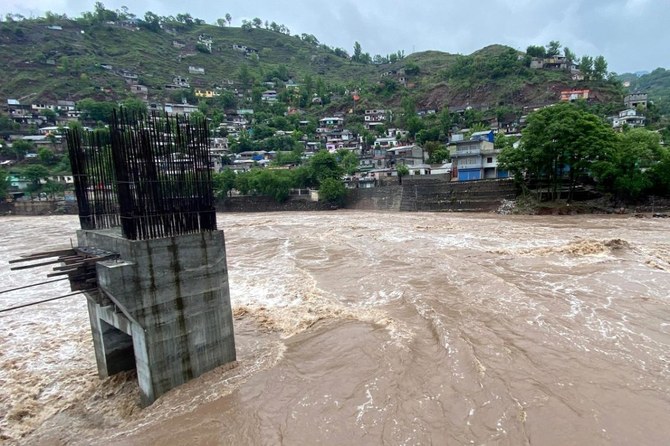
- Pakistan received more than twice as much rain as usual for the month
- Pakistan is increasingly vulnerable to unpredictable weather, as well as often destructive monsoon rains that usually arrive in July
ISLAMABAD: Pakistan experienced its “wettest April since 1961,” receiving more than twice as much rain as usual for the month, the country’s weather agency said in a report.
April rainfall was recorded at 59.3 millimeters, “excessively above” the normal average of 22.5 millimeters, Pakistan’s metrology department said late Friday in its monthly climate report.
There were at least 144 deaths in thunderstorms and house collapses due to heavy rains in what the report said was the “wettest April since 1961.”
Pakistan is increasingly vulnerable to unpredictable weather, as well as often destructive monsoon rains that usually arrive in July.
In the summer of 2022, a third of Pakistan was submerged by unprecedented monsoon rains that displaced millions of people and cost the country $30 billion in damage and economic losses, according to a World Bank estimate.
“Climate change is a major factor that is influencing the erratic weather patterns in our region,” Zaheer Ahmad Babar, spokesperson for the Pakistan Meteorological Department, said while commenting on the report.
While much of Asia is sweltering dure to heat waves, Pakistan’s national monthly temperature for April was 23.67 degrees Celsius (74 degrees Fahrenheit) 0.87 degrees lower than the average of 24.54, the report noted.



